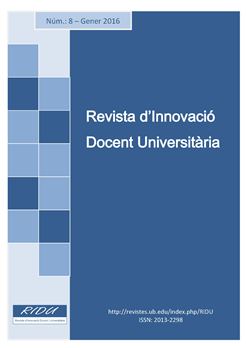Multivariate positioning of graduate students, academics and entrepreneurs’ expectations by means of categorical principal component analysis
DOI:
https://doi.org/10.1344/RIDU2016.8.9Keywords:
Competencies, Expectations, Graduate students, Academics, Entrepreneurs, Surveys, University, Multivariate positioning, Categorical principal components (CATPCA)Abstract
This paper is intended to analyse the acquisition of competencies and working abilities during university education. We analyse how the didactic framework fits the abilities that the labour market demands to the university students to get into it. In order to do so we have simultaneously surveyed the recently graduated students, as well as the teachers and the employers. By means of categorical principal components we analyse the present situation of young workers in terms of their competencies. We find significant differences between the perception on the acquired competences level and the required level to enter the labour market among the different groups analysed. We design different composite indicators which allow us to detect a greater degree of discrepancy between entrepreneurs regardless of the type of competence.References
[1] Agència per a la Qualitat del Sistema Universitari de Catalunya (2003) Guia d’avaluació externa de la transició al mercat laboral: Comitès específics per titulacions. Generalitat de Catalunya, Barcelona.
[2] Agencia Nacional de Evaluación de la Calidad y Acreditación (2004) Competencias específicas de formación disciplinar y profesional. ANECA, Madrid.
[3] Alba-Ramírez, A. (1993) Mismatch in the Spanish labor market: overeducation? The Journal of Human Resources, 28(2), pp. 259-78.
[4] Alcañiz, M., Claveria, O., Riera, C. (2014) Competencias en educación superior desde tres perspectivas diferentes: estudiantes, empleadores y académicos. Revista Iberoamericana de Educación, 66(2), pp. 1-19.
[5] Chevalier, A., Lindley, J. (2009) Overeducation and the skills of UK graduates. Journal of the Royal Statistical Society: Series A, 172, pp. 307-337.
[6] Di Pietro, G., Urwin, P. (2006) Education and skills mismatch in the Italian graduate labour market. Applied Economics, 38(1), pp. 79-93.
[7] Gifi, A. (1990) Nonlinear multivariate analysis. Department of Data Theory, Leiden.
[8] Grande, I., Abascal, E. (2005) Análisis de encuestas. ESIC, Madrid.
[9] Green, F., McIntosh, S. (2007) Is there a genuine under-utilization of skills amongst the over-qualified? Applied Economics, 39(4), pp. 427-439.
[10] Heijke, H., Meng, C., Ris, C. (2003) Fitting to the job: the role of generic and vocational competencies in adjustment and performance. Labour Economics, 10(2), pp. 215-229.
[11] Linting, M., Meulman, J.J., Groenen, P.J.F., Van der Koojj, A.J. (2007) Nonlinear principal components analysis: Introduction and application. Psychological Methods, 12(3), pp. 336-358.
[12] Martín, M., Rabadán, A.B., Hernández, J. (2013) Desajustes entre formación y empleo en el ámbito de las Enseñanzas Técnicas universitarias: la visión de los empleadores de la Comunidad de Madrid. Revista de Educación, 360(1), pp. 244-267.
[13] Mavromaras, K., McGuinness, S., O’Leary, N., Sloane, P., Wei, Z. (2013) Job Mismatches and Labour Market Outcomes: Panel Evidence on University Graduates. Economic Record, 89, pp. 382-395.
[14] McMillan, J.H., Schumacher, S. (2005) Investigación educativa. Pearson Addison Wesley, Madrid.
[15] Meulman, J.J. (1998) Optimal scaling methods for multivariate categorical data analysis. SPSS White Papers.
[16] Munroe, T., Westwind, M. (2009) What makes Silicon Valley tick? The ecology of innovation at work. Nova Vista Publishing, New York.
[17] Paganini, R. (2009) Una introducción a Tuning Educational Structures in Europe. La contribución de las universidades al proceso de Bolonia. Publicaciones de la Universidad de Deusto, Bilbao.
[18] Roberson, M.T., Carnes, L.W., Vice, J.P. (2002) Defining and measuring student competencies: A content validation approach for business program outcome assessment. Delta Pi Epsilon Journal, 44(1), pp. 13-24.
[19] Salas, M. (2003) Educación superior y mercado de trabajo. Grupo Editorial Universitario, Granada.
Downloads
Published
Issue
Section
License
Authors whishing to publish in this journal agree to the following conditions:
- The author or author retain copyright and grants the journal the right of first publication of the paper.
- The texts will be published under license "Reconocimiento Creative Commons 4.0 España", which allows to share, distribute, reproduce and the public communication of the paper, as long as the name of the author or authors and the journal are clearly stated.







